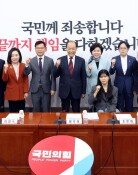Cacophony Rises Over Social Contract on Job Creation
Cacophony Rises Over Social Contract on Job Creation
Posted February. 09, 2004 22:59,
The Korean Confederation of Trade Unions (KCTU), an umbrella of independent trade unions, said on February 9 that it will start a work-sharing campaign by reducing overtime hours, a move that is fueling controversy.
Meanwhile, the Federation of Korean Industries (FKI), a business lobby, demanded some parts of the tripartite social contract, which was signed by representatives from government, labor, and industry late last week, should be reconsidered as they run counter to an improved competitive edge.
The KCTU said in a press conference at its headquarters, that full respect for the principle of a 40-hour workweek will create a considerable number of jobs. It said it will help create jobs with an anti-overtime campaign.
The KCTU said it will launch the campaign at 1,000-plus workplaces such as public corporations, financial institutions and large companies starting July 1. It projected at least 500,000 jobs will be created by the time the campaign is spread to all sectors.
Employers expressed concern about the campaign, citing an increase in wage bills.
Investment should be increased by lessening burdens on corporations to create jobs, Lee Dong-eung, director of the Korea Employers Federation (KEF) said. Hiring new employees by reducing overtime hours will increase financial burdens on them. Lee Soo-ho, the new KCTU chairman, commenting on the job creation social contract of February 8, said, I wonder whether it will be viable because the contract was signed hurriedly and excluded the KCTU, of which about 80 percent of trade unions at the big corporations belong.
Concerning a two-year freeze of wages at large corporations in the contract, Lee said, This rough-and-ready, one-time measure presupposes the sacrifice of workers, which will lead to the social contract foremost highlighted by wage freezes. He concluded, The wage freeze will weaken workers buying power, decrease consumer spending, and make economic growth much tougher.
Asked whether or not the KCTU will join the tripartite commission of the government, industry, and labor he answered, As we have repeatedly said before, the KCTU will join the commission only if it becomes an independent body which can implement its own contracts. He also proposed a meeting with the president, other high-level officials and the employers representatives.
The KCTU also proposed: 1) negotiations of social contracts on an industry-by-industry basis; 2) cancellation of the governments provisional seizure of trade union assets in a damages lawsuit against trade unions and; 3) formation of a tripartite arbitration body to resolve about 40 prolonged labor disputes.
In related news, Lee Gyu-hwang, a FKI director in a meeting of standing committee members of the tripartite commission, said, The social contract stipulates that excessive arbitrary adjustments of employment should be held in check. He continued, However, any change in employment launched by management according to its need is arbitrary. Lee concluded, excessive should be replaced with unreasonable.
Id like to point to the fact that the agreement on the social contract is a proposal by the basic principle committee of the commission, not a final version, said FKI director Lee.
李浩甲 gdt@donga.com kong@donga.com
Headline News
- Acting president fills key court vacancies, opposition cries foul
- Graham Allison raises alarm over 'Thucydides Trap' as U.S.-China tensions rise"
- Samsung posts 6.6 trillion won operating profit in Q1
- Chinese teens caught filming Air Force jets without authorization
- S. Korea’s early presidential election set for June 3







